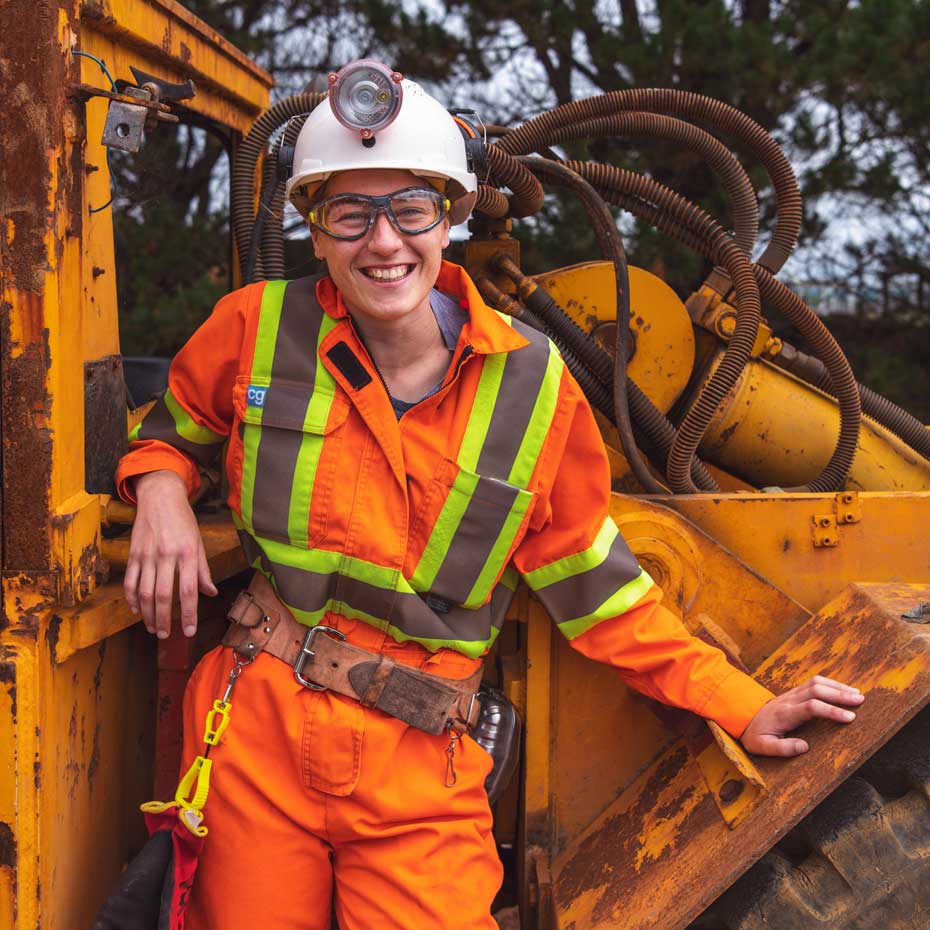The Camborne School of Mines is celebrating 30 years as part of the University of Exeter and 135 years since its creation.
Professor Lisa Roberts

“We are so proud to be celebrating the 30th anniversary of The Camborne School of Mines becoming a vital part of The University of Exeter in Cornwall, as well as celebrating 135 years since the school’s creation. The Camborne School of Mines is a world-renowned leader in research and skills for the global mining industry and is leading the way in the quest for sustainable mining practices and the sourcing of the critical minerals required for the transition to net zero.”
Professor Lisa Roberts, Vice-Chancellor and Chief Executive at The University of Exeter
Professor Pat Foster, Head of Camborne School of Mines

"CSM has a proud history and an exciting future. Mining is integral to modern society and building a greener future. As part of the University of Exeter we are able to work with colleagues in a truly interdisciplinary way to develop solutions to global challenges. We have achieved a great deal over the past 30 years including increasing our portfolio of courses, particularly at Masters Level and our new mining degree apprenticeship starting next month. We look forward to seeing what can be achieved together in the next 30 years."
Professor Pat Foster, Head of Camborne School of Mines
Professor Martin Siegert – Deputy Vice-Chancellor (Cornwall), University of Exeter
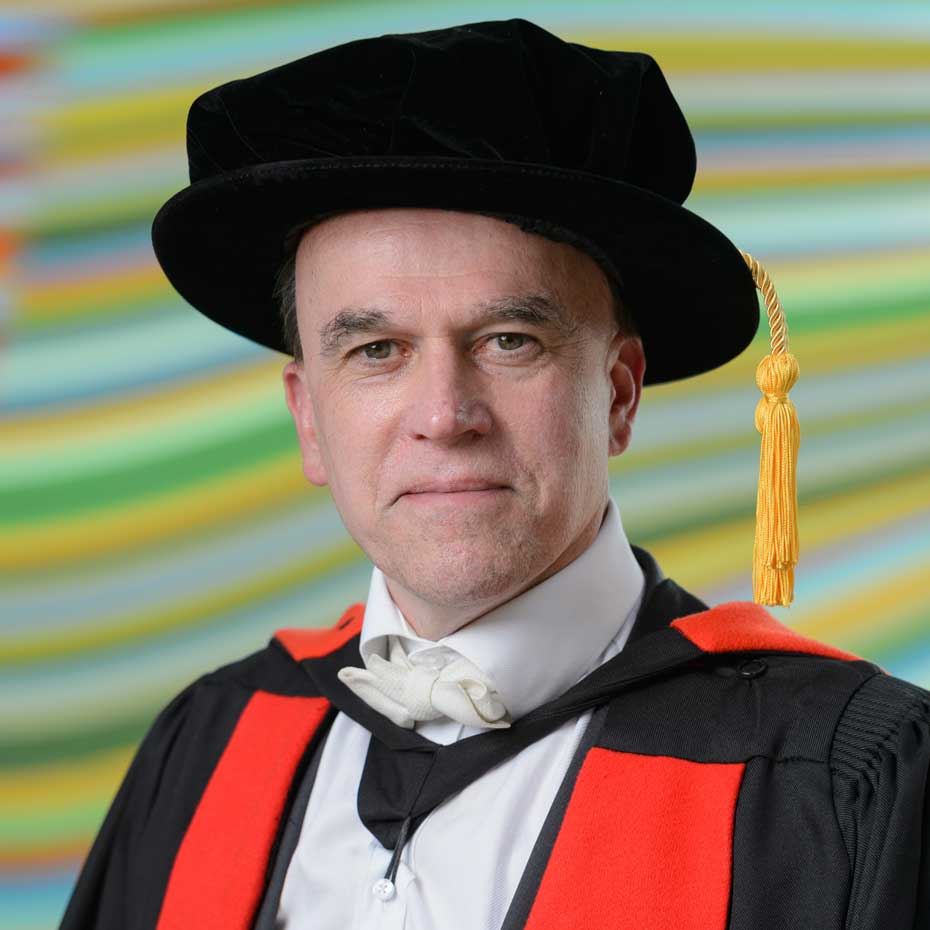
"The Camborne School of Mines (CSM) is one of the world's leading mining institutions and we are incredibly proud to be celebrating 30 years of partnership here at the University of Exeter, Cornwall. Since we joined forces in 1993 hundreds of students have gained our qualifications and gone on to enjoy successful careers all over the world.
The work done at CSM has never been more crucial, as the world transitions to net zero and the demand for critical minerals increases. It is hugely important that we mine sustainably, and CSM’s research, teaching and industry links can help ensure this happens.”
Professor Martin Siegert – Deputy Vice-Chancellor (Cornwall), University of Exeter
The History of The Camborne School of Mines
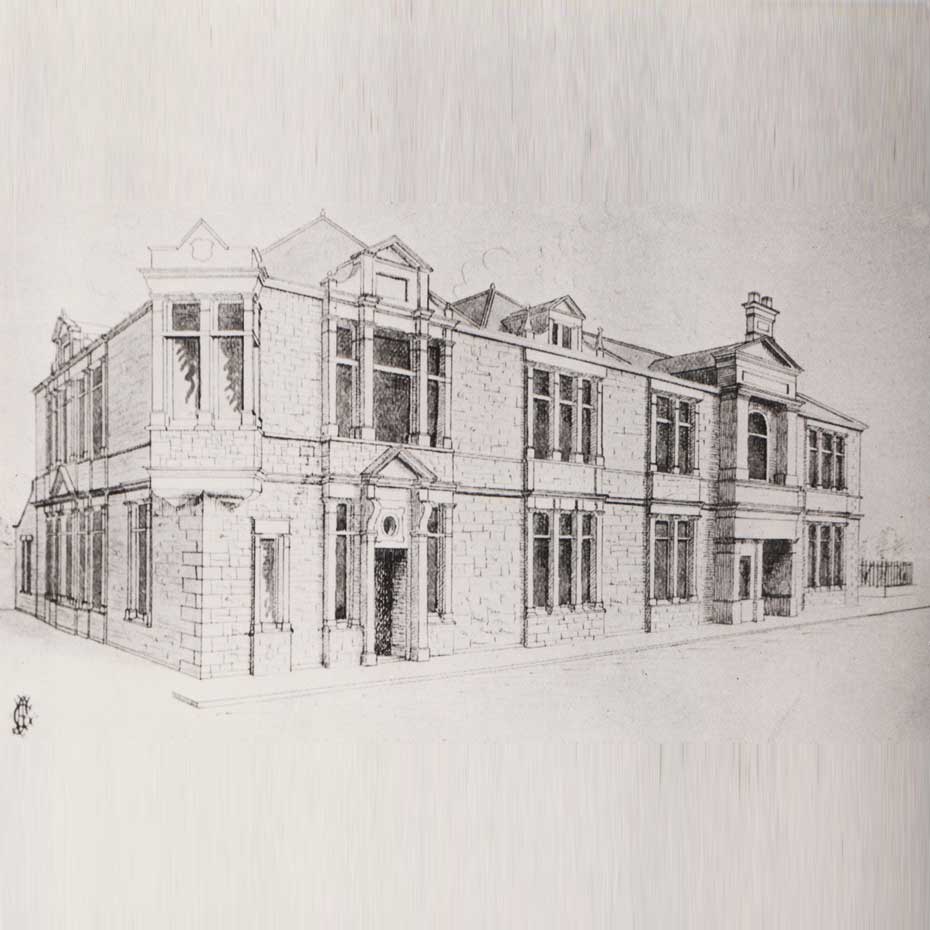
The Camborne School of Mines began life in 1888 as one of three full-time mining schools established in Cornwall, which was among the most important and influential metalliferous mining regions worldwide. Shortly after its formation, Mr Pendarves, a local mineral owner reported that the school had: “…a total of 189 students and the whole of the other mining schools of Cornwall could not come up to anything like that, if they were all put together.”
By the early 1900s, the Camborne School had several facilities at its disposal including classrooms, offices, chemical and metallurgical laboratories, and a geological museum plus lecture rooms. King Edward Mine had also been acquired for practical training in both underground and surface work.
The three schools were amalgamated to form the School of Metalliferous Mining and continued to flourish. For many, employment overseas was the favoured option and graduates were already to be found in most of the world's major mining areas such as Southern Africa, Malaysia, Australia, South America, Mexico, USA and Canada. This adaptation to globalisation within the minerals industry strengthened CSM’s position as a leading international educational institution – a position it still enjoys today.
CSM was located in the centre of Camborne for almost a century but, following major investment by the international mining industry and others, relocated in 1975 to purpose-built facilities mid-way between Camborne and Redruth. In 1993, CSM was incorporated into the University of Exeter. Initiatives by the University of Exeter and others to expand Higher Education provision in Cornwall came to fruition in 1999 with the launch of the Combined Universities in Cornwall (CUC) Initiative, with CSM relocating to its current location at Tremough (now Penryn Campus) during summer 2004.
Click here to view a timeline of the history of The Camborne School of Mines.
CSM leads Circular Economy Centre in Technology Metals
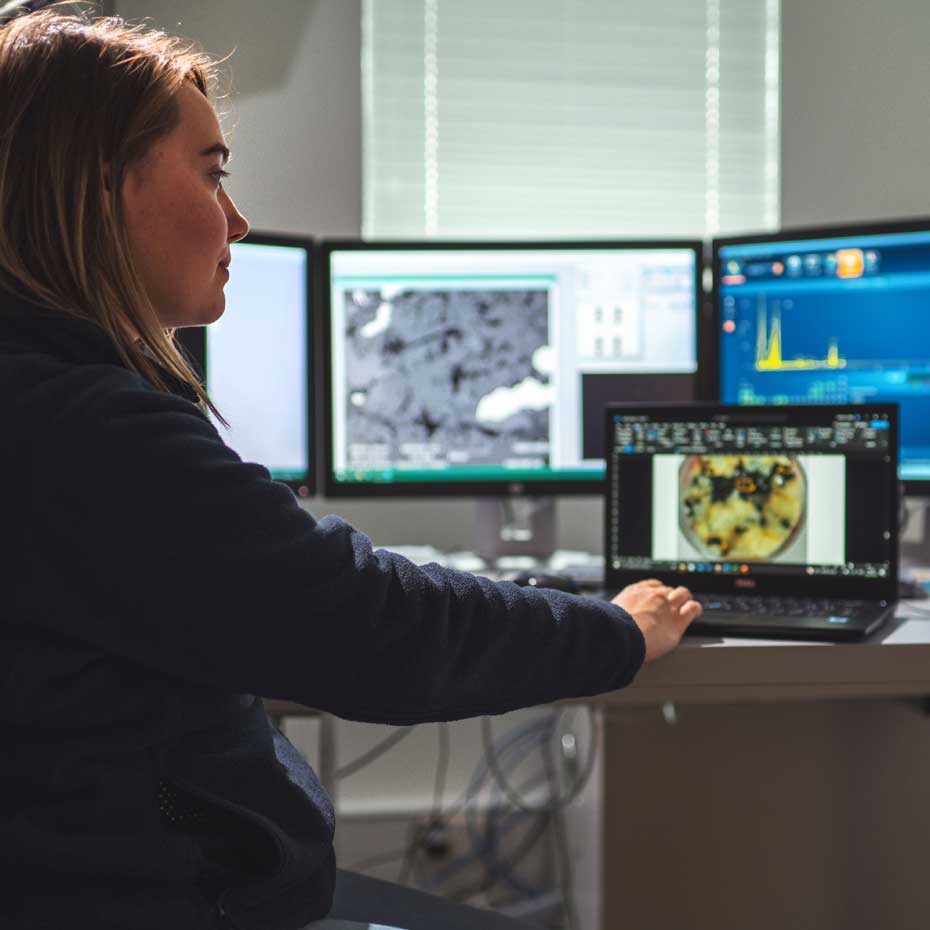
CSM experts are leading a pioneering new research centre, designed to revolutionise how crucial metals are extracted, used and reused in clean and digital technologies across the UK. The Interdisciplinary Circular Economy Centre in Technology Metals explores how to create a circular economy for the technology metals such as cobalt, rare earths and lithium that are essential in all clean and digital technologies including electric cars and wind turbines.
The centre focuses on developing a new cycle, right from the first stages of extraction, to enable secure and environmentally acceptable circulation of these crucial materials within the UK economy.
The centre brings together experts from the Universities of Exeter, Birmingham, Manchester, Leicester and the British Geological Survey, as well as 40 partner companies and organisations. As well as researchers from The Camborne School of Mines, Exeter also provides expertise from the Environment and Sustainability Institute, the Renewable Energy department and the Business School. The centre applies circular economy principles to every aspect of mineral use in clean and digital technologies, including the initial extraction stage.
The research began with a case study of the industry ecosystem in Cornwall. With its exploration projects for the technology metals, lithium, tin and tungsten, the region has the opportunity to lead in whole system circular economy actions for these metals.
CSM plays crucial role in UK Critical Minerals Strategy

The Camborne School of Mines played an important role in a pivotal UK strategy to secure the supply chain of critical minerals. Professor Frances Wall, Professor of Applied Mineralogy at The Camborne School of Mines, provided advice for the key report, called Resilience for the Future: The United Kingdom’s Critical Minerals Strategy, published in 2022.
Professor Wall participated in an expert panel group to discuss critical mineral supply chains and submitted evidence on critical minerals circular economy research and mining education. The strategy contains three main actions: to accelerate growth of the UK’s domestic capabilities; collaborate with international partners; and enhance international markets to make them more responsive, transparent and responsible.
The strategy also outlines Government plans to work with The Camborne School of Mines to boost its position as a world-leading mining school and launch a degree apprenticeship in mining engineering in 2023.
The report highlighted the need for the UK to improve the resilience of critical minerals supply chains and increase the security of supply. In his introduction, the Secretary of State for Business, Energy and Industrial Strategy noted, ‘The UK’s mining and minerals history runs deep, dating back to the Bronze Age. In most mines today, it is said you can usually find someone who has trained at the world-renowned The Camborne School of Mines – such is the UK’s historical strength."
Did you know....? CSM take part in historic Varsity event

Did you know that CSM participates in one of the oldest and most historic Varsity sports events?
The Bottle Match is a varsity match played between The Camborne School of Mines and the Royal School of Mines (RSM), Imperial College London. The first recorded match between the two sides took place on 16 December 1902, making it the second oldest rugby varsity match in the world.
The Bottle Match started as a rugby union match but as the schools sporting interests diversified other sports began to be played and from 2006 is now made up of six games played between the two institutions: men's rugby union, football, men's and women’s hockey, squash and golf. As of 2010 Netball has been included as an event.
The Bottle Match is traditionally held during the month of February normally on the last weekend of the month. Ancient rivalry between the RSM and CSM ensures that the competition gets fiercer by the year!
If it can’t be grown, it has to be mined!

It is no exaggeration to say that the modern world would not be able to function without mined minerals. From smart phonesto wind turbines and even toothpaste, the mining industry plays a pivotal role in their production and growth.
Indeed, mining and minerals are an essential component for sustainable development in modern economies. While minerals such oil, gas, coal and uranium energise the modern world, modern gadgets like smart phones could not function without a fair quantity of copper, silver, gold, palladium, platinum, ceramics, titanium dioxide and indium tin oxide.
Modern transport would not be possible without mining – a car, for example, contains close to a ton of iron and steel, 100 kg of aluminium and 19 kg of copper.
And it also plays an integral part in sustainable and green energy production, with a 2 MW wind turbine featuring around 300 t of steel, 5 t of copper, 3 t of aluminium and the casting of about 1 200 t of concrete, which requires limestone that is mined and stone that is quarried.
Mining is no less important for many of the home comforts we take for granted -the modern compact fluorescent light bulb, for example, needs mined minerals like bauxite, lead, copper, limestone, nickel and phosphorous.
Even toothpaste would not be possible without mining, as it contains silica, limestone, aluminium, phosphate, fluoride and titanium.
These interesting facts and figures reinforce the idea that, if it can’t be grown it has to be mined.
Digging Deeper for vital copper deposits
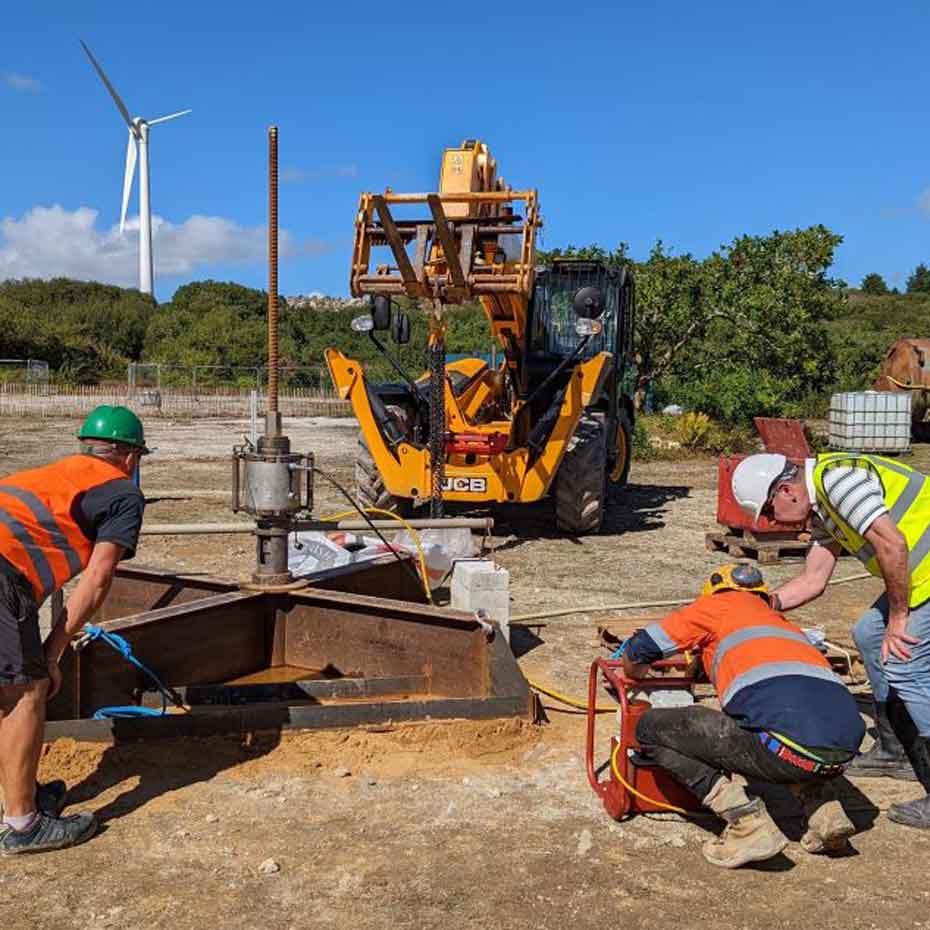
From the battery in your mobile phone to the wiring and plumbing in your house, copper is a fundamental ingredient in modern life. It can be 100% recycled, and its superior conductivity makes it irreplaceable for use in sustainable energy devices, from solar panels to wind turbines. Copper has a part to play in medicine too because bacteria won't grow on it, making it widely used in hospitals. But as technology becomes increasingly sophisticated and prevalent, experts predict the demand for copper is likely to outstrip supply. To help tackle this, Dr Ben Williamson, a geologist at the University of Exeter, with colleagues Professor Richard Herrington and Anna Morris from the Natural History Museum, London, developed a new and relatively inexpensive way to establish whether certain types of magmatic rocks are likely to host valuable copper deposits.
Dr Williamson's project in 2018 compared the chemical composition of minerals from magmatic rocks that host porphyry copper deposits against the same type of rocks which are barren (i.e. contain no economic deposit). The method was tested during a case study of a major new porphyry discovery in Chile, revealing that minerals from magmatic rocks that host porphyry deposits have distinctive chemical characteristics which can be used as one of a suite of exploration indicators.
The deposits, which originally form at several kilometres below the earth's surface, above large magma chambers, are relatively rare, particularly the largest deposits that are most economic to mine. Dr Williamson's research means that Anglo American can more effectively target areas for exploration, at an early stage, to reduce financial risk and unnecessary environmental disturbance.
Survey takes to the skies over Cornwall
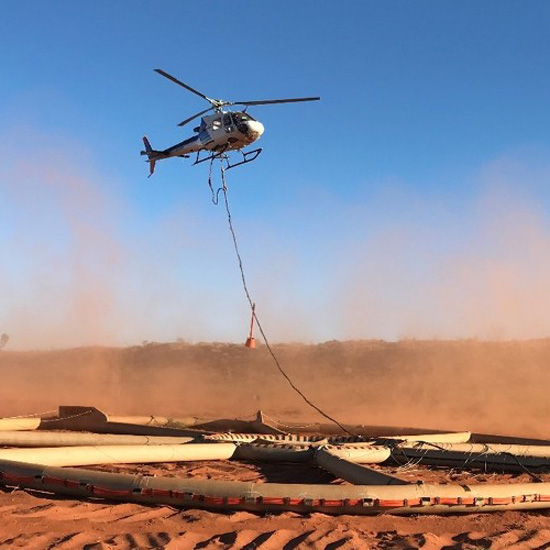
Earlier this year, a sophisticated aerial survey to map the geology, natural resources and environment of Cornwall took to the skies. A team from the Deep Digital Cornwall Project, led by the University of Exeter’s The Camborne School of Mines (CSM) and Institute for Data Science and Artificial Intelligence (IDSAI), coordinated an airborne electromagnetic (AEM) survey over Cornwall, covering around 100km2 in two areas near United Downs and Redmoor, near Callington.
The survey saw a state-of -the-art sensor towed beneath a helicopter, to measure the natural electrical conductivity of the Earth’s surface and subsurface, to help reveal the composition of soils and rocks, as well as the location of subsurface water. The airborne survey helped improve the understanding of Cornwall’s geology including mapping of the granite underground, regional fault systems and location of mineralisation of potential economic interest.
It helped innform, for example: (i) exploration for minerals that contain the technology metals required for the transition to Net Zero (e.g., lithium, tin, tungsten, copper); (ii) the potential contribution of geothermal energy to the region’s energy mix; and (iii) our understanding of hydrogeology and groundwater which is important to mitigate flooding and coastal erosion.
The new data, which complement previous surveys in the area, including the Tellus South West project, will be made publicly available for further research via the Deep Digital Cornwall Hub and within the Deep Digital Cornwall 4D Visualisation Suite.
New toolkit aids discovery of mineral deposits crucial to ‘green economy’ transition
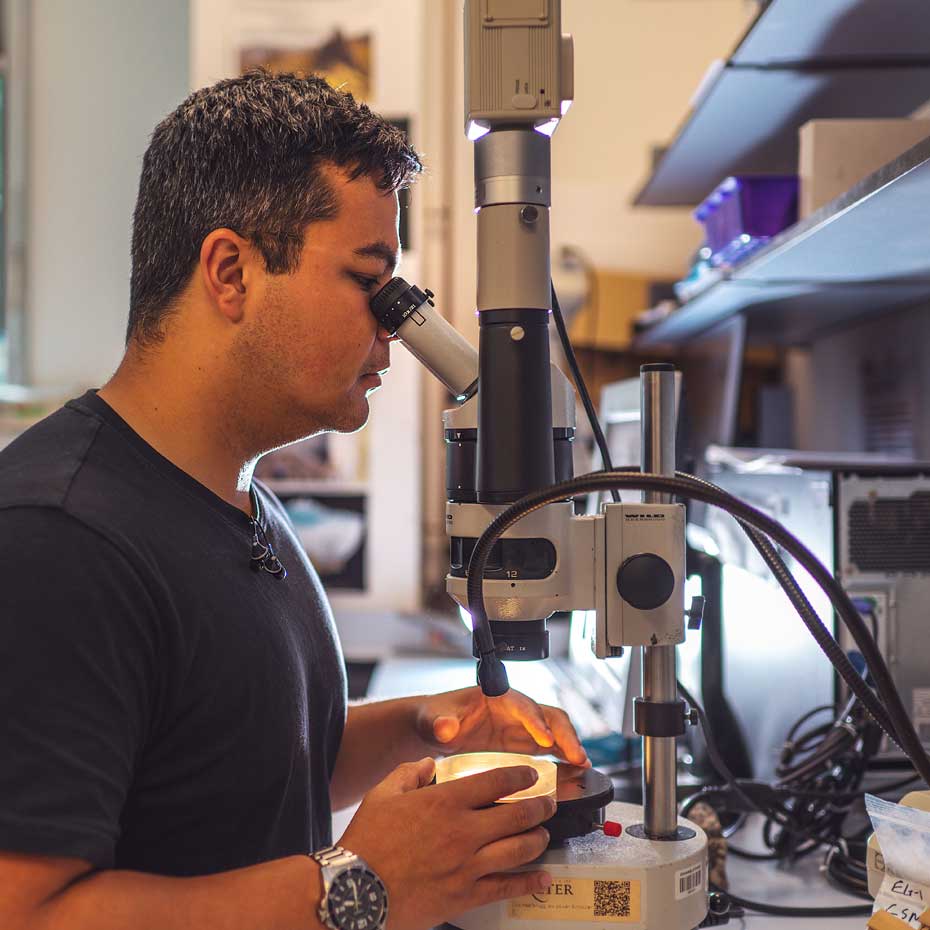
Scientists have developed a new toolkit for the discovery of mineral deposits crucial to our transition to a ‘green economy’. A study led by Lawrence Carter from the University of Exeter’s Camborne School of Mines, has given fascinating new insights into how to discover porphyry-type copper deposits.
Porphyry-type deposits provide most of the world’s copper and molybdenum, as well as large amounts of gold and other metals, which are of increasing demand for green technologies such as electric vehicles, wind turbines and solar panels, and for power transmission. They are the principle target of many mining companies who employ a wide range of invasive and expensive exploration techniques to find them.
Porphyry-type deposits originally form several kilometres below the Earth’s surface above large magma chambers. Not only are they rare but most large near-surface examples have already been found. To meet future demand for copper, new methods are needed to discover deeper and possibly smaller deposits – using techniques that meet increasingly strict environmental regulations.
The researchers show that certain textures preserved in rock may be indicative of the types of physical processes that form these deposits and may give an early indication of their location. Previous understanding of such textures was disjointed because they are often small, poorly exposed or are simply not recognised when encountered.
The study was carried out in the Yerington district of Nevada where tilting of the upper crust has provided a globally unique cross-section through four porphyry-type deposits and their host rocks. Because of this, previous studies in the district have underpinned much of the current understanding of how porphyry-type deposits form.
Deep Digital Cornwall helps unlock underground environment
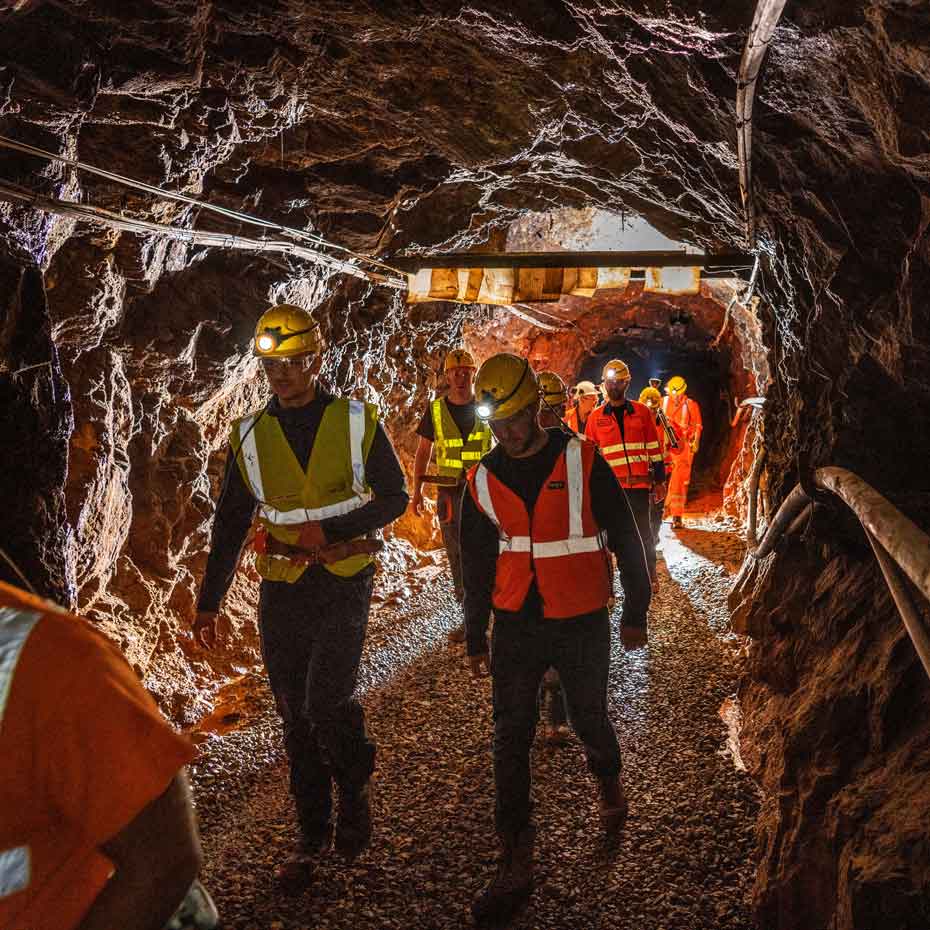
The underground environment is the subject of a major £4 million project to create a world-leading cluster of research-intensive digital businesses in Cornwall and the Isles of Scilly. The pioneering project, called Deep Digital Cornwall, led by The Camborne School of Mines (CSM) with the Institute for Data Science and Artificial Intelligence at the University of Exeter, conducts research and champion innovation with 40 of the region’s SMEs. With grant funding from the European Regional Development Fund, the project benefits from three delivery partners: Cornish Lithium, Cornwall Resources Limited (CRL) and the South West Centre of Excellence in Satellite Applications (SWCoESA). A new physical research hub has been created on the University of Exeter’s Penryn Campus, offering a state-of-the-art 3D modelling and visualisation suite with dedicated researchers, innovators and business development specialists.
The underground is a much neglected but essential environment. It is the source of all of our metals and minerals, shapes our landscapes, provides water, heat and cooling, and controls the composition of soils. Deep Digital Cornwall carries out research into digital technologies and, in partnership with regional SMEs, develop new digital products, processes and services to enhance SME offerings to sectors including mining, geothermal, civil engineering, surveying and water resources, heritage, planning and more. With a rich mining heritage and a renewed national interest in georesources, Deep Digital Cornwall will leverage the region’s unique research skills, collaborations and SME network, to boost regional economic growth.
Philanthropic donation helps achieve a sustainable future for mining
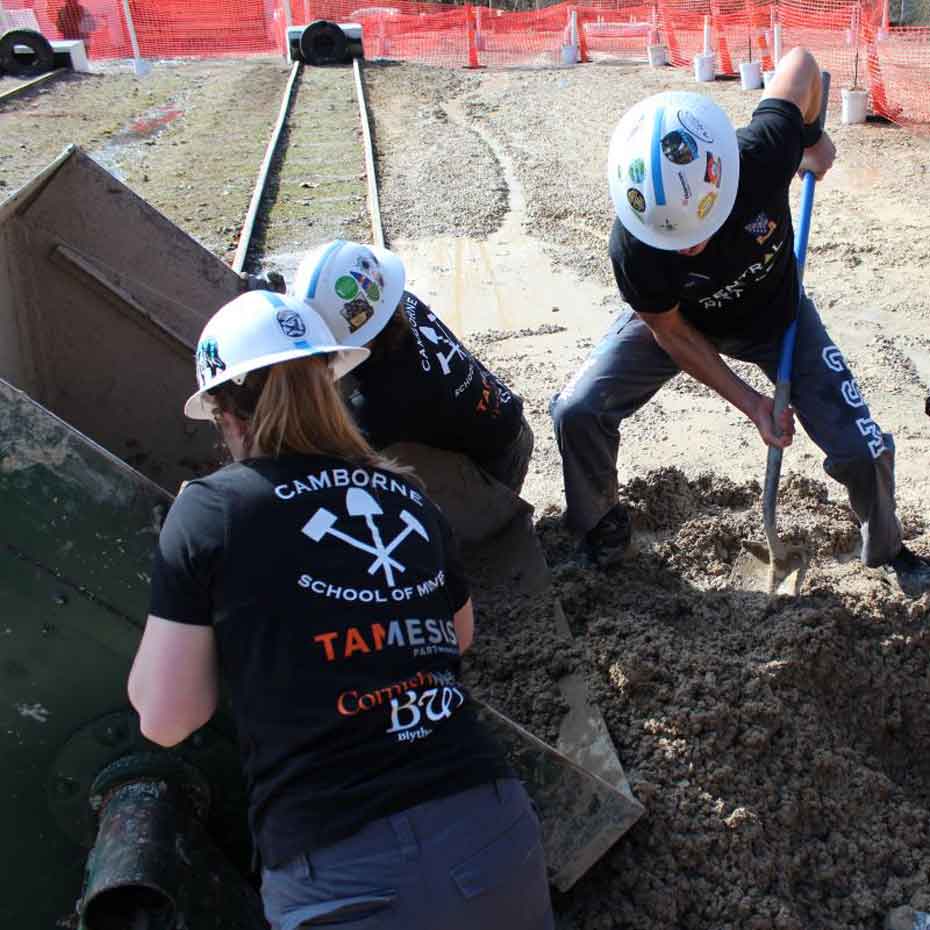
Anglo American, one of the world’s leading mining companies, recently made a transformational donation to support sustainable mining research and education at The Camborne School of Mines, University of Exeter. The £3.5 million donation will fund a research programme combining the study of mining engineering with environmental and social sciences and include interdisciplinary and policy-related work. It will include a Professorial Chair and a cohort of post-Doctoral Fellowships.
The ‘Mark Cutifani Anglo American Chair in Mining Innovation’ will honour the achievements of Mr Mark Cutifani, Chief Executive of Anglo American, who retired in June 2022 after nine years. During his time as Chief Executive Mr Cutifani led a transformation that reduced environmental incidents by 97% and led to a 92% drop in occupational health cases. He also introduced a sustainable mining plan with nine stretch goals to achieve a healthy environment, support thriving communities and being recognised as a trusted corporate leader. These goals include reducing emissions, achieving net positive impact on biodiversity, improving energy and water efficiency, and being carbon neutral by 2040.
The ‘Mark Cutifani Anglo American Chair in Mining Innovation’ reflects the ambitions set out in this sustainable mining plan and recognises the need to approach mining activity responsibly, with an emphasis on the proactive development of new technologies, taking into account their technical, social, environmental and governance impacts.
2,000 years of Cornish mining tradition

Mining has a rich tradition in Cornwall, dating back more than 2,000 years.
Tin Mining has been a major industry in the county since before the birth of Christ, with Cornish traders were exporting to Europe and the Roman Empire, while the brass work in King Solomon's Temple is said to have been wrought from Cornish tin.
The tinners were granted special privileges in Cornwall by reason of their important contribution to the economy, and like most closed societies were very superstitious.
Their history is packed with odd traditions and tales. In particular, they were very wary about offering the spirits who lived in the mines - the knockers, buccas (imps) and spriggans, and a host of others.
Stories of disembodied hands carrying candles, spirit voices warning of impending rock falls and ghostly black dogs and white hares prophesying certain disaster abound throughout Cornwall.
The traditional Cornish Pasty was a "packed lunch" for the tinner, often containing meat and vegetables at one end and a sweet filling at the other. The platted or "crimped" crust was a very important part of the pasty - but was never intended to be eaten.
Arsenic is often a by product of mining and would naturally be present on the miners fingers when they ate their pasties. Consequently, the crust was used to hold the pasty until the contents has been eaten, and then thrown away.
Perceptions of mining / tech and industry
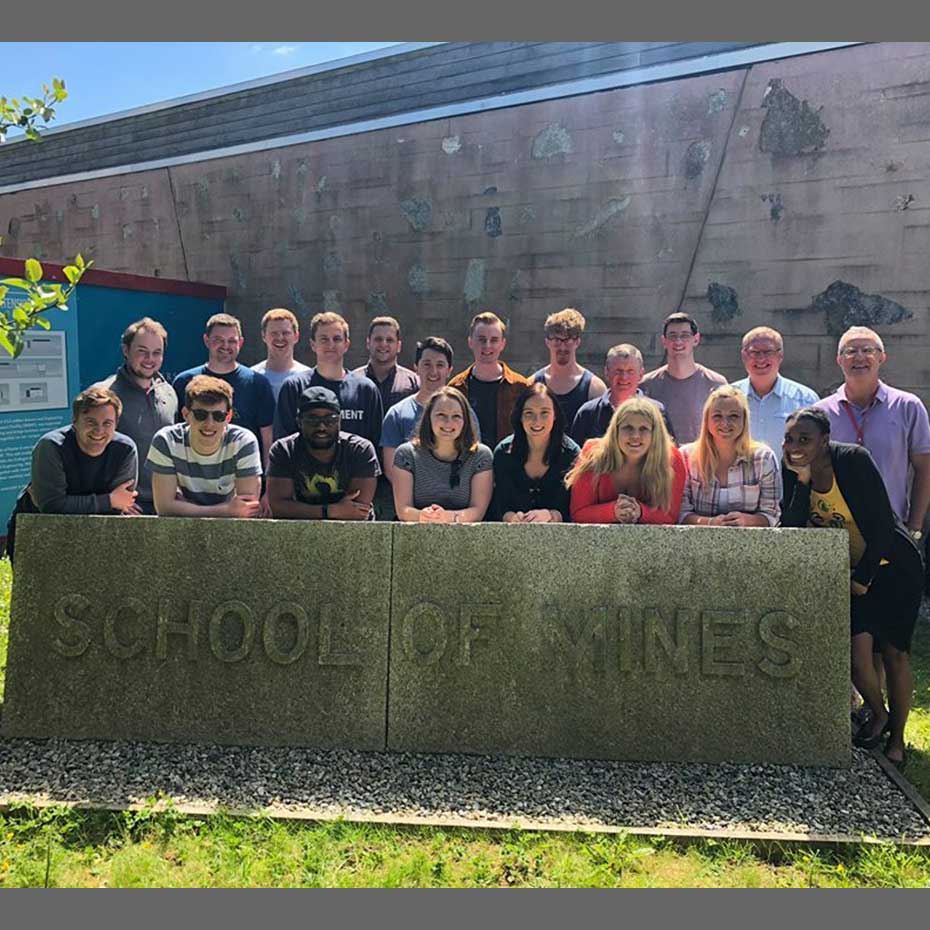
When you ask theaverageperson about their thoughts on mining, the conversation invariably turns to images of a man covered in dirt hitting a cave wall with a pick-axe.
But nothing could be further from the truth.
For a start, not all mining jobs take place in dark, dank, underground spaces. The mining industry in fact includes exploration, development, operations, processing as well as mine closures and land reclamation. Since most of these parts of the mining cycle occur aboveground, most workers in the mining industry do not work underground.
Furthermore, many careers in mining have nothing to do with physically extracting resources from the earth. People who work in mining can be found in high-rise office buildings in large cities, in labs, and out in communities collaborating with local citizens.
The industry also employs some of the most technically advanced tools in existence. Rather than hand tools and brute force, thanks to rapid technological advances in the mining industry, it is rare today that miners use their own physical strength to extract resources.
Instead, robotics, computers and other state-of-the-art equipment to become commonplace and miners can dig through 2400 feet of rock in order to reach minerals located deep underground while operating equipment from a completely different city than where the mine is located.
Due to the sophisticated equipment and leading-edge technology used in the mining industry, highly skilled and educated workers are required to work in mining. The skills necessary may include computer technology, information management, mining extraction knowledge or mineral processing, as well as many others.
What are known as “soft skills” are becoming increasingly important in mining as well. Mining companies need people who can grow the business, understand and stay ahead of complicated laws and regulations, and ensure they operate in a sustainable, community-friendly way.
Scholarship programme honours Mining alumnus

Richard Osman (MSc Mining Geology, 1999), a graduate of The Camborne School of Mines, was honoured posthumously by friends and former colleagues who have set up a scholarship scheme at his alma mater.
The Richard Osman Memorial Fund provides funds to train the next generation of young mining professionals and will support 40 scholars over a 20-year period. Two students will be funded each year to follow in Richard’s footsteps and study on the prestigious MSc Mining Geology course at CSM. A Geology teaching lab has also been named after him in his honour.
Richard grew up in Wales before coming to Cornwall to complete his Masters. Richard then worked in the mining industry in Australia, Africa and the Middle East. Whilst working with Centamin plc in Egypt Richard was one of the main driving forces behind the Geology and Mining department that that took the Sukari gold mine to a resource of +15moz Au with a production profile that now ranks in the top 20 gold mines in the world.
In May 2016 Richard lost his life in a plane crash at just 40 years of age.
Study Mining Engineering
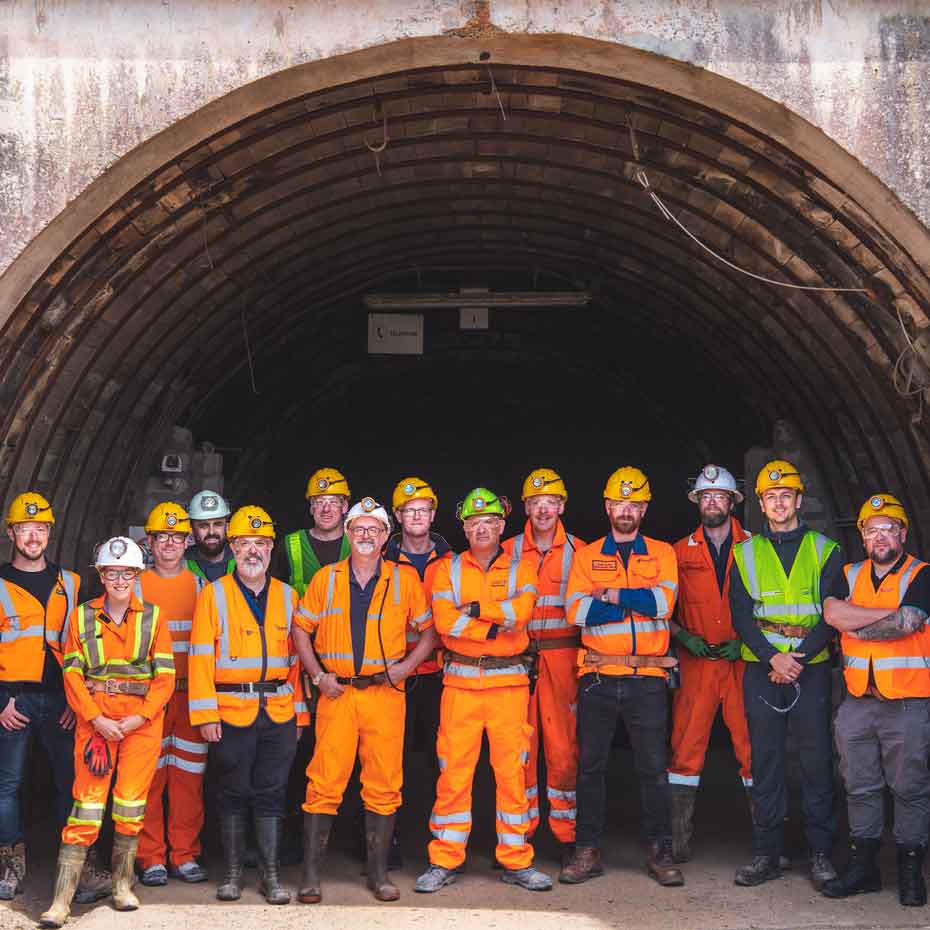
CSM has launched two innovative new Mining Engineering programmes, designed to deliver key learning and professional development for those in the industry. Both the Mine Management Degree Apprenticeship programme, and the BEng Mining Engineering programme, which will begin from September. The programmes will provide current mining employees from diverse business specialisms, regulators and service providers with a wide-ranging, innovative, flexible and industry-relevant exposure to every aspect of the global mining value chain.
The programmes have been developed to help upskill those already holding roles within the mining industry, who want to develop their career. Participants will study a broad range of topics including the underlying maths, digital, geology and physics skills that inform engineering, mine design, operations, economics, environment and social governance.
The ground-breaking courses blend online learning with residential workshops to allow professionals to develop their careers by undertaking accredited advanced educational studies, while maintaining their industry roles.
The Mining Management Degree Apprenticeship is a four-year course beginning in September 2023. For more information visit Mine Management | Degree Apprenticeships | University of Exeter. The BEng Mining Engineering course is part-time, and also starting in September 2023. For more information please visit here.
CSM welcomes new partnership with Leica Geosystems
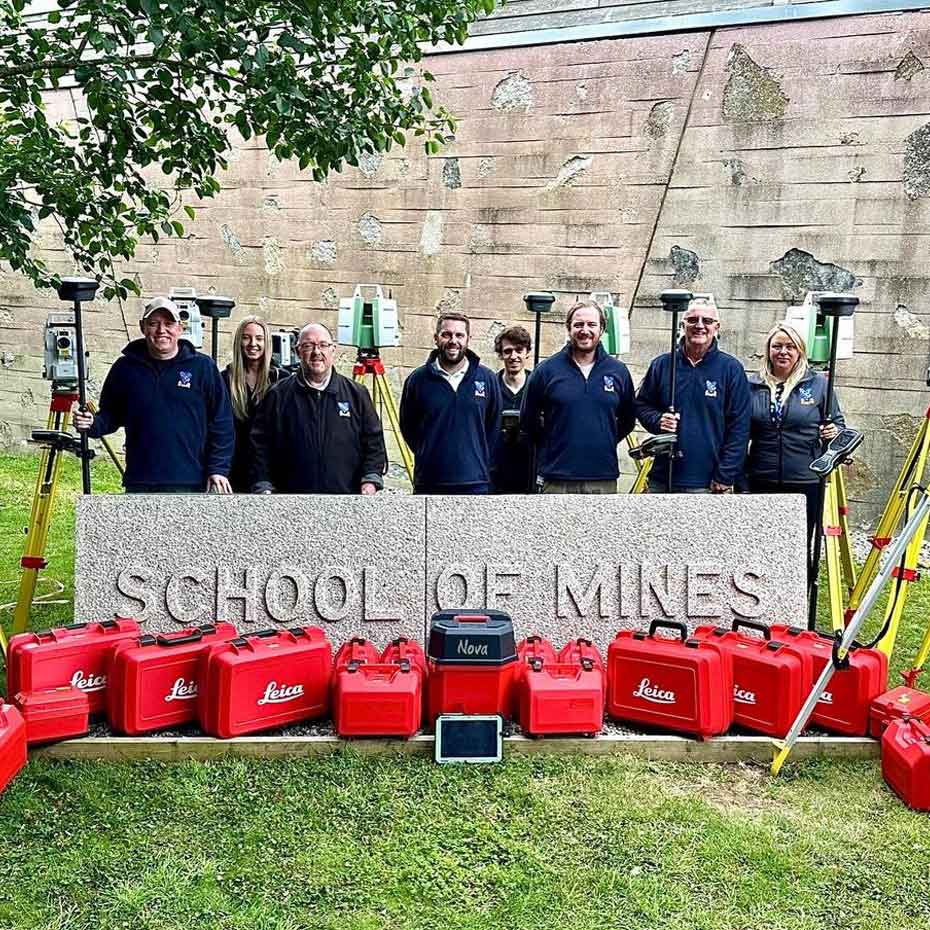
The Camborne School of Mines have recently established a partnership that will allow students to benefit from using the latest, state-of-the-art technology for their studies. CSM has welcomed a new partnership with Leica Geosystems part of Hexagon to supply leading surveying equipment to the school. The cutting-edge equipment includes total stations, RTK GNSS, multi-stations and laser scanners, and will provide a wide-arching benefit in advancing teaching and research applications.
CSM receives major software donation
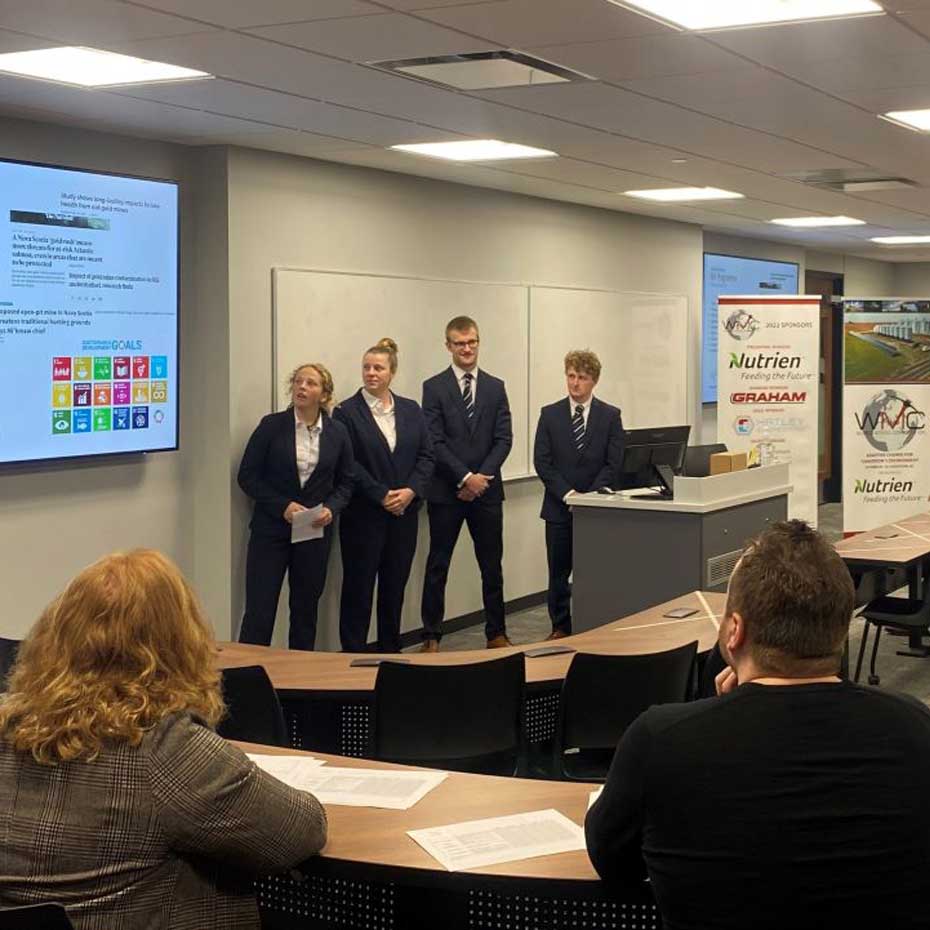
Students at The Camborne School of Mines are able to gain fascinating new insights into 3D geological modelling of the subsurface, though pioneering new software. CSM secured a new licensing agreement with Petroleum Experts (Petex), a leading developer of optimization software for the oil and gas industries. The Scotland-based firm donated 10 licenses of its MOVE software package to CSM, based at the University of Exeter’s Penryn Campus in Cornwall, for research and training purposes. The software suite, valued at £1,334,160.00, is considered the industry standard for geological modelling and structural analysis of Earth’s deep interior. The software is used for teaching and research into structural modelling and reconstructions, as well as slip-analysis to identify favourable fault zones for geothermal energy potential.
Founded in Edinburgh in 1990, Petex is one of Europe’s fastest growing technology companies, with more than 420 clients worldwide. Petex, which has U.S. offices in Houston, Texas and Lafayette, Louisiana, develops software modules that help geologists obtain two- and three-dimensional images of features below Earth’s surface.
Cornwall in the limelight at United Nations
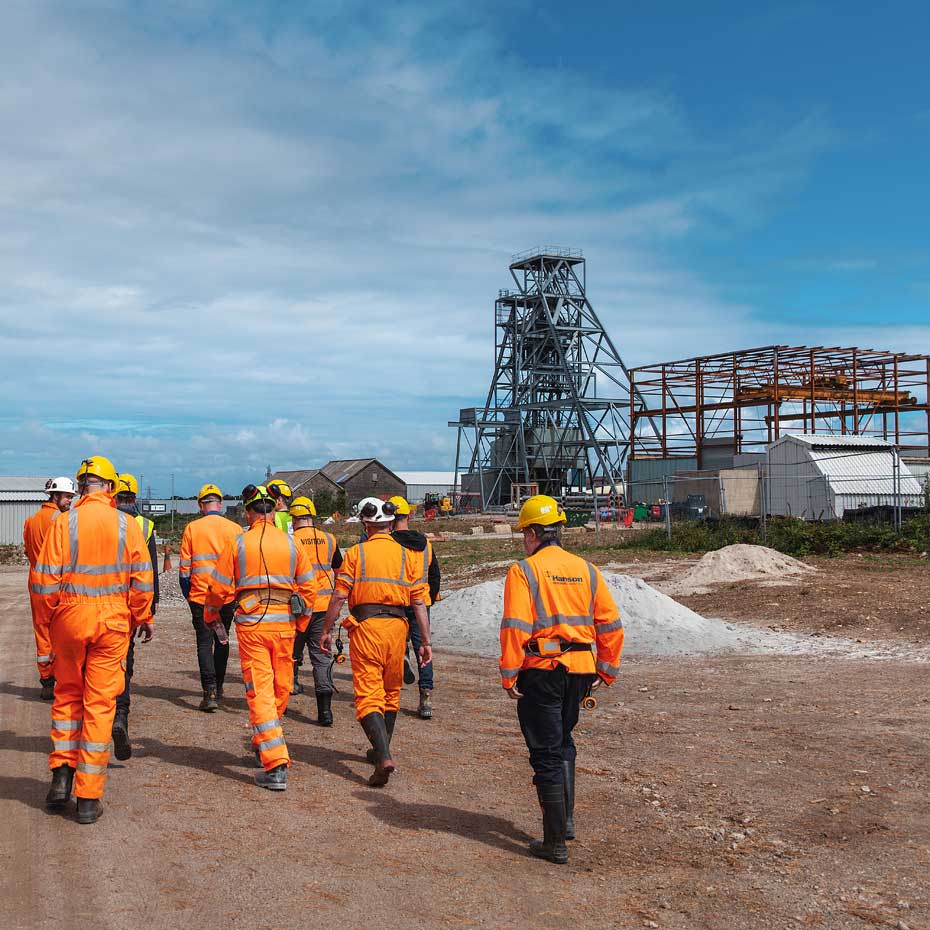
Cornwall was in the limelight at the United Nations earlier this year, with researchers at The Camborne School of Mines delighted that two short films introducing the new United Nations Resource Management System (UNRMS) and its first application in Cornwall were launched at the Palais des Nations in Geneva, Switzerland. The films, featured in the opening session of the UN Resource Management Week, introduced by Professor Frances Wall. The Camborne School of Mines has been working with the Cornwall and Isles of Scilly Local Enterprise Partnership to consider all the actions that Cornwall needs to take to make the renaissance of metals mining a success. This work uses the new UN Resource Management System as its framework and is the first case study of the new system, which will be rolled out across the globe using learning from the first examples.
The University team has made two films to help with this: one to introduce the Cornwall case study and one as a general introduction to the UNRMS. University researchers are attending the conference to present their results from Cornwall and discuss how circular economy research can help towards the UNRMS and UN sustainable development goals.
The United Nations Economic Commission for Europe, based in Geneva, has created its new resource management system to help national and regional governments consider the whole range of sustainable development actions needed to make sure that truly sustainable development will flow from mineral resources.
The films were made by researchers from the UKRI Met4Tech Interdisciplinary Circular Economy Centre for Technology Metals at The Camborne School of Mines, University of Exeter and funded by the Department of Business and Trade to complement the UK Critical Minerals Strategy.
CSM bring home the gold from Mining Games
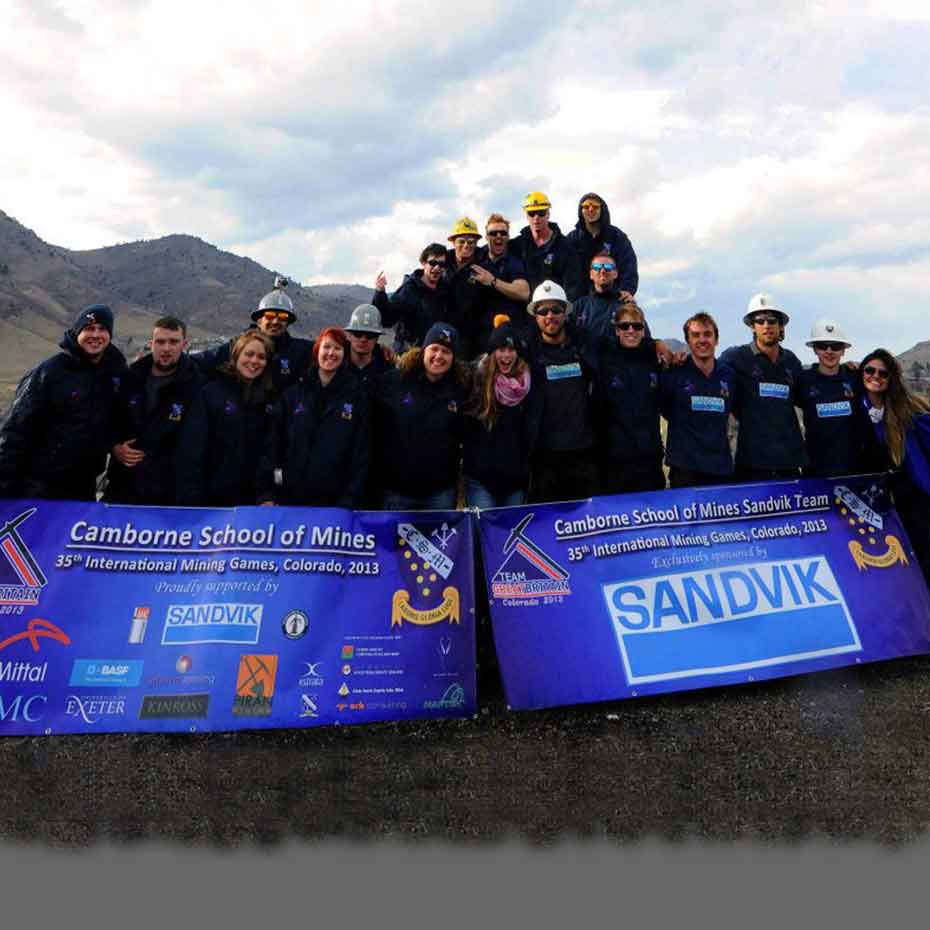
Students from The Camborne School of Mines have a long history of success at the International Mining Games. The celebrated event began in 1978 in honour of miners killed after fire broke out at the Sunshine mine near Kellogg, Idaho, USA, as well as all miners who have perished in the line of duty. The competition seeks to keep the old-fashioned mining techniques alive, as well as strengthen the camaraderie of contemporary mining students.
One of the most successful years for CSM Students was in 2014, when students celebrated winning gold in two exhilarating events. Two teams from the mining school, the Men’s A team and the Co-ed team, secured top spot in the ‘mucking’ event at the Games, held in the Midwestern US state of Missouri. The mucking event involves competing teams running a one ton ore wagon down a 75’ track and filling it as quickly as possible. In total, three teams from CSM - the only representatives from the UK taking part – competed in the illustrious contest, earning a host of podium places.
As well as gold in the mucking, the Men’s A team also secured silver in both the saw and the hand steel events, while the Co-ed team, who were sponsored by engineering group Sandvik, won silver in the sawing, surveying, track and gold panning events. The Men’s B team enjoyed success in the surveying event, also winning silver.
CSM professor appointed first female President of Mineralogical Society
.jpg)
Professor Frances Wall made history when she was elected as the first female president of the Mineralogical Society of Great Britain and Ireland. Professor Wall was elected to the prestigious post in 2014, and held the tenure for two years. The Mineralogical Society of Great Britain and Ireland was formed in 1876, and serves to publicise scientific knowledge of the mineral sciences in the fields of crystallography, geochemistry, petrology, environmental science and economic geology.
The Society publishes scientific journals, books and monographs, as well as organising and sponsoring scientific meetings.
The Future of Mining in Cornwall
CSM within the Department of Earth and Environmental Sciences (DEES) has been leading research on critical metals for many years, in partnership with local government, exploration companies and NGOs. In one of the current projects, the Interdisciplinary Circular Economy Centre for Technology Metals (Met4Tech), is working with CSM and its partners to investigate how circular economy principles can be embedded within geomodels, in order to achieve a sustainable technology critical metals industry in Cornwall and elsewhere. This event (part of the Environment and Sustainability Institute’s 10 year anniversary series) gave participants an update, using publicly available information, on exploration activities in Cornwall and on the research in Met4Tech that is building future circular economy scenarios for sustainable mining in Cornwall.
MSc Mining Environmental Management – Graduate in Focus

2022 MSc Mining and Environmental Management graduate Claudia tells us what first appealed to her about this postgraduate degree and what it was like to study and live here in Cornwall. She talks about her favourite parts of the course, how it is taught and the support she received from the learning community she became a part of.

